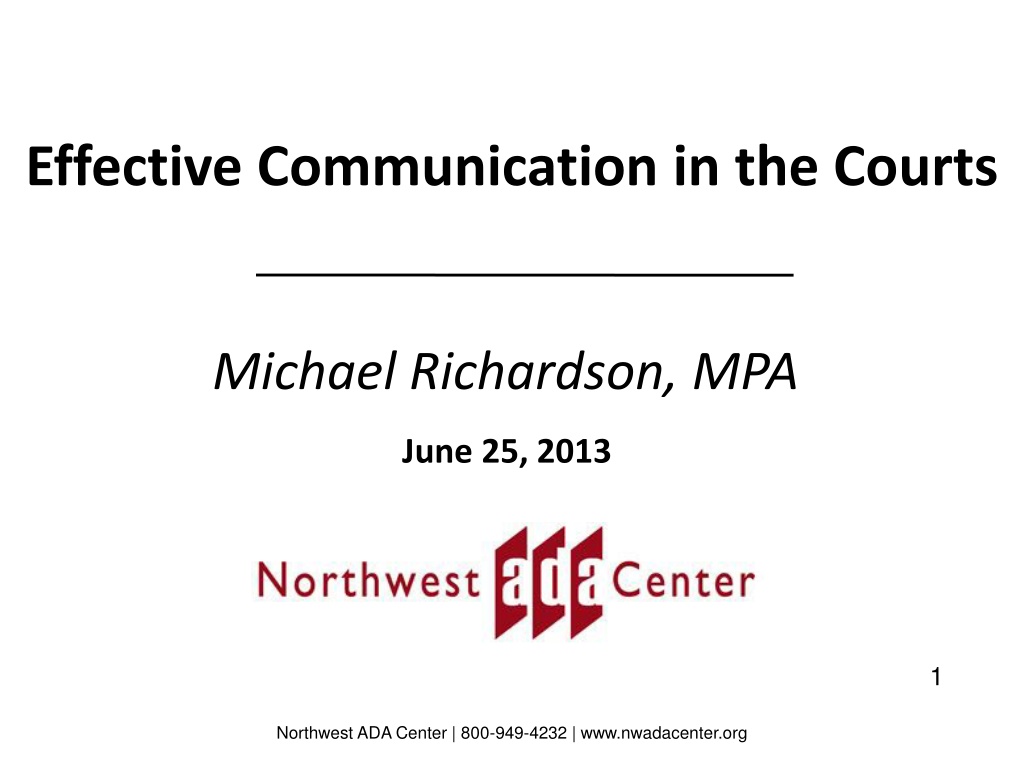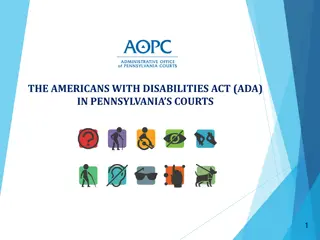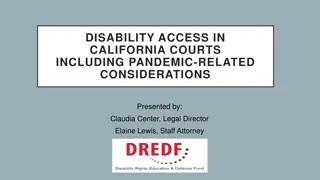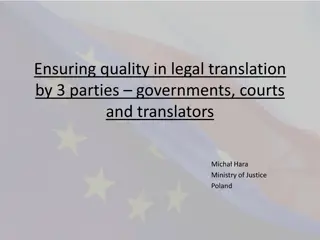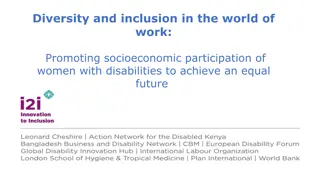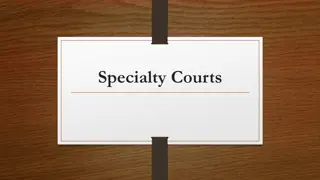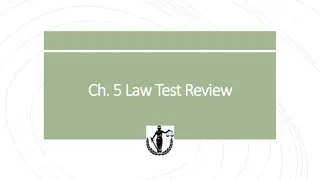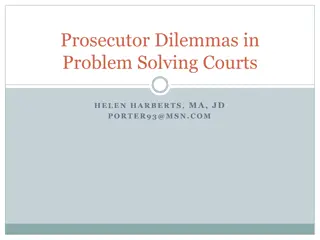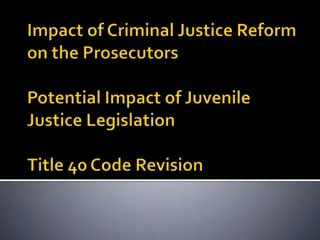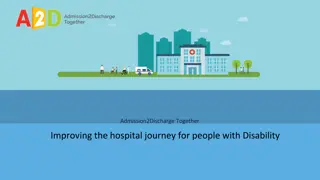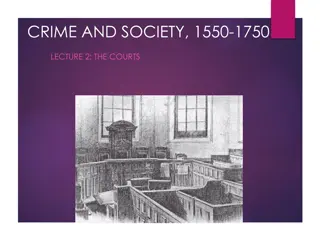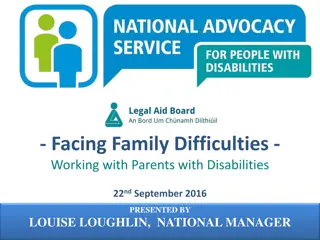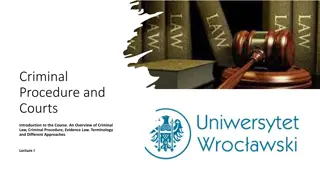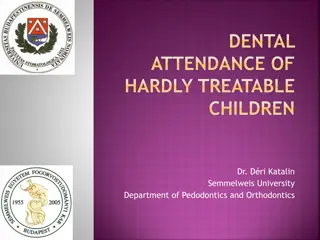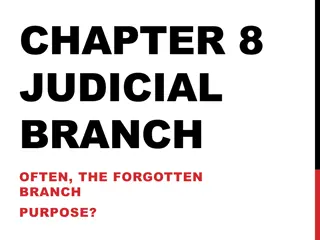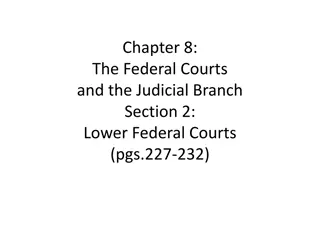Understanding Effective Communication in Courts for People with Disabilities
This material from the Northwest ADA Center provides insights into effective communication practices for individuals with disabilities in state and local courts. It covers the importance of communication, auxiliary aids and services, and action planning for support. The Americans with Disabilities Act (ADA) ensures the right to effective communication in government entities. The content explains who is protected and covered under the ADA concerning court activities.
Download Presentation

Please find below an Image/Link to download the presentation.
The content on the website is provided AS IS for your information and personal use only. It may not be sold, licensed, or shared on other websites without obtaining consent from the author. Download presentation by click this link. If you encounter any issues during the download, it is possible that the publisher has removed the file from their server.
E N D
Presentation Transcript
Effective Communication in the Courts Michael Richardson, MPA June 25, 2013 1 Northwest ADA Center | 800-949-4232 | www.nwadacenter.org
Technical Assistance Training Material Dissemination Research Public Awareness 2 Northwest ADA Center | 800-949-4232 | www.nwadacenter.org
Objectives Have a basic understanding of effective communication for people with disabilities Understand the importance of effective communication in state and local courts Broaden knowledge of various auxiliary aids and services Development of an action plan for providing effective communication support. 3 Northwest ADA Center | 800-949-4232 | www.nwadacenter.org
The ADA in Brief The right to effective communication between state and local government entities and people with disabilities is based on a federal law, Part A of Title II of the Americans with Disabilities Act (ADA) 4 Northwest ADA Center | 800-949-4232 | www.nwadacenter.org
Who is Protected? Individuals who have a physical or mental impairmentthat substantially limits one or more major life activities; Individuals who have a record of a physical or mental impairment that substantially limited one or more of the individual s major life activities; and Individuals who are regarded as having such an impairment, whether they have the impairment or not. 5 Northwest ADA Center | 800-949-4232 | www.nwadacenter.org
Who is Covered? The ADA protects individuals with a disabilities who participate in court activities, including litigants, witnesses, jurors, spectators, traffic violators, conservators, victims, and attorneys. The law applies to any type of court proceeding, including civil, criminal, traffic, small claims, domestic relations, probate, bankruptcy, juvenile, and other specialized courts. 6 Northwest ADA Center | 800-949-4232 | www.nwadacenter.org
Who is Covered? Other activities may include: Interactions with court personnel Educational activities Marriage ceremonies performed by court personnel 7 Northwest ADA Center | 800-949-4232 | www.nwadacenter.org
Title II Accommodation Requirements To provide access to qualified individuals with disabilities, state/local courts are required to: Make reasonable modifications to policies and practices, Remove architectural, communication or transportation barriers, and Provide auxiliary aids and services. 8 Northwest ADA Center | 800-949-4232 | www.nwadacenter.org
What is Effective Communication? Communication occurs in many ways: Speaking, listening, reading and writing are all common ways of communicating. A public entity shall take appropriate steps to ensure that communications with applicants, participants, and members of the public with disabilities are as effective as communications with others. 28 C.F.R. 35.160(a) 9 Northwest ADA Center | 800-949-4232 | www.nwadacenter.org
Why is Effective Communication Important? Communication is key to full participation in court services. There may be serious consequences resulting from the lack of communication access for people with disabilities in the court system. 10 Northwest ADA Center | 800-949-4232 | www.nwadacenter.org
Common Scenarios Cuevas v. City of Hialeah, Florida A deaf couple alleged that the police failed to provide qualified interpreters and involuntarily committed the wife to a hospital on two separate occasions because she was deaf. This matter was resolved. * *National Association of the Deaf 11 Northwest ADA Center | 800-949-4232 | www.nwadacenter.org
Common Scenarios A deaf woman, in danger of physical violence from her ex-boyfriend, went to her local courthouse seeking an Order of Protection. When the courthouse did not provide her with an interpreter, she was unable to participate in the hearing. As a result, she did not get crucial legal protection against her abuser. * * National Association of the Deaf 12 Northwest ADA Center | 800-949-4232 | www.nwadacenter.org
Common Scenarios A late-deafened father told the judge he could not hear or understand the proceedings in which he sought custody of his children. When the judge instructed the man to wear his hearing aids, he explained that they were not particularly helpful. The judge held the man in contempt of court and sent him to jail for a few days.* * National Association of the Deaf 13 Northwest ADA Center | 800-949-4232 | www.nwadacenter.org
Common Scenarios A hard-of-hearing grandmother petitioned to become an intervenor in her grandson s custody hearing. The court refused to provide her with computer assisted real-time transcription (CART) because she was not a party to the case. Without CART services, she was unable to understand or participate in the proceedings and the grandchild was placed in state custody. * * National Association of the Deaf 14 Northwest ADA Center | 800-949-4232 | www.nwadacenter.org
Auxiliary Aids and Services Under the ADA and its regulations, state and local courts are required to provide auxiliary aids and services to ensure effective communication with people with disabilities during civil and criminal proceedings. 28 C.F.R. 35.160(b)(1) 15 Northwest ADA Center | 800-949-4232 | www.nwadacenter.org
Auxiliary Aids and Services The provision of auxiliary aids and services also applies to all members of the public who seek participation in a court s programs, services, and activities, including parties to legal proceedings and their companions, witnesses, jurors, and spectators. 16 Northwest ADA Center | 800-949-4232 | www.nwadacenter.org
Determining What Accommodation is Appropriate In determining what type of auxiliary aid and service is necessary, courts shall give primary consideration to the requests of the individual with disabilities. 28 C.F.R. 35.160(2) Unless the court can demonstrate that an equally effective alternative is available, given the nature, circumstances, length, complexity, and importance of the communication process. 17 Northwest ADA Center | 800-949-4232 | www.nwadacenter.org
Requesting Documentation of Need for an Accommodation Generally, not necessary or appropriate. If it is not apparent how the requested accommodation relates to an individual s disability, it is acceptable for the court to require documentation from a qualified health care provider in order to fully and fairly evaluate the accommodations request. 18 Northwest ADA Center | 800-949-4232 | www.nwadacenter.org
Can a Court Charge for Auxiliary Aids or Services? Litigants, attorneys, defendants, spectators, or any other persons with disabilities involved in the proceedings, cannot be charged for the auxiliary aid or service provided by a state or local court. See 28 C.F.R. 35.130(f). Some states still have laws that permit judges to assess the cost of auxiliary aids or services, such as qualified interpreter services, as court costs. These state laws violate the ADA and its intent. 19 Northwest ADA Center | 800-949-4232 | www.nwadacenter.org
Undue Burden The ADA does not require courts to take any action that would impose an undue financial or administrative burden. The decision about whether the accommodation request imposes an undue burden on the court should be made by a presiding judge or his/her designee. 20 Northwest ADA Center | 800-949-4232 | www.nwadacenter.org
Auxiliary Aids and Services for Individuals who are Deaf of Hard of Hearing qualified interpreters note-takers computer-aided transcription services written materials assistive listening systems closed caption decoders, open and closed captioning TTYs/TDDs, telephone relay service, or video relay service real-time transcription exchange of written notes. 21 Northwest ADA Center | 800-949-4232 | www.nwadacenter.org
Auxiliary aids and services for individuals who are blind or visually impaired adjustable lighting, or a location with better lighting taped text qualified readers (individuals or electronic readers) assistance in filling out forms materials in Braille large print materials materials in electronic format on compact discs or in e-mails audio recordings 22 Northwest ADA Center | 800-949-4232 | www.nwadacenter.org
Auxiliary aids and services for individuals with speech impairments speech synthesizers* communication boards* sign language interpreting access to laptop computer/keyboard for typed communication *Speech synthesizers and communication boards are personal devices. Courts are not required to furnish such devices, but should allow individuals to bring in their own for effective communication purposes. 23 Northwest ADA Center | 800-949-4232 | www.nwadacenter.org
2010 Revisions to Effective Communication Requirements Qualified reader: new definition. Qualified interpreter: revised definition. Companions with disabilities. Types of auxiliary aids and services that are necessary to ensure effective communication. Use of individuals or children as interpreters. Performance standards for video remote interpreting services. 24 Northwest ADA Center | 800-949-4232 | www.nwadacenter.org
Deafness For individuals who are deaf and use sign language, the most effective auxiliary aid or service which a court can provide is usually the service of qualified sign language interpreters, who are trained in legal procedure and terminology. 25 Northwest ADA Center | 800-949-4232 | www.nwadacenter.org
Qualified Sign Language Interpreter An interpreter who, via a video remote interpreting (VRI) service or an on-site appearance, is able to interpret effectively, accurately, and impartially, both receptively and expressively, using any necessary specialized vocabulary... includes sign language interpreters, oral transliterators and cued-language transliterators . 28 C.F.R. 35.104 26 Northwest ADA Center | 800-949-4232 | www.nwadacenter.org
Qualified Sign Language Interpreter The ADA definition does require certification. State laws and regulations may impose additional requirements for interpreters. The law that offers greater coverage and protection for people with disabilities applies. 27 Northwest ADA Center | 800-949-4232 | www.nwadacenter.org
Qualified Sign Language Interpreter Recommendation: Interpreters working in court settings should have some form of national certification in addition to formal legal interpreter training. Such certification and training serves as an indication of competence. 28 Northwest ADA Center | 800-949-4232 | www.nwadacenter.org
Family Members as Interpreters? No!! Family members do not meet the requirements of a qualified interpreter because they usually cannot remain impartial, and often do not have the language skills, interpreter, or legal training to effectively and accurately interpret a court proceeding. 29 Northwest ADA Center | 800-949-4232 | www.nwadacenter.org
Video Remote Interpreting (VRI) Definition: An interpreting service that uses video conferencing technology over dedicated lines or wireless technology offering high-speed, wide bandwidth video connection that delivers high quality video images... 30 Northwest ADA Center | 800-949-4232 | www.nwadacenter.org
Video Remote Interpreting (VRI) 31 Northwest ADA Center | 800-949-4232 | www.nwadacenter.org
Communication Access Realtime Translation For individuals who are deaf but do not rely on sign language for communication and who have good levels of reading comprehension, the appropriate auxiliary aid or service is usually the use of transcription services, such as Communication Access Realtime Translation (CART). 28 C.F.R. 35.104. 32 Northwest ADA Center | 800-949-4232 | www.nwadacenter.org
Communication Access Realtime Translation CART converts spoken words instantly into text using a stenotype machine, computer, and special software. Real-time transcriptionists are not reporters of official record. 33 Northwest ADA Center | 800-949-4232 | www.nwadacenter.org
Communication Access Realtime Translation 34 Northwest ADA Center | 800-949-4232 | www.nwadacenter.org
Individuals who do not Sign For individuals who wear hearing aids or who have cochlear implants, the appropriate auxiliary aid might be amplified sound equipment, a courtroom with appropriate acoustic properties, and/or assistive listening systems (FM systems, etc.). 35 Northwest ADA Center | 800-949-4232 | www.nwadacenter.org
Telephone Communications If public phones are made available, courts must also provide teletypewriters (TTYs) or computer equipment with TTY capability to place telephone calls. For incoming calls, a TTY may not be necessary, but court employees must be instructed to accept and handle relayed calls (telephone relay and video relay) 36 Northwest ADA Center | 800-949-4232 | www.nwadacenter.org
Modification to Policies and Practices Creativity may be necessary to ensure effective communication. Courts are required by law to make reasonable modifications in their policies, practices and procedures, when necessary to prevent discrimination on the basis of disability. 28 C.F.R. 35.130(b)(7). 37 Northwest ADA Center | 800-949-4232 | www.nwadacenter.org
Modification to Policies and Practices Example: A courthouse may have only one courtroom with equipment necessary for an assistive listening device. If an individual requests such a device to observe or participate in a proceeding, the court should make efforts to move the proceeding to the accessible courtroom. 38 Northwest ADA Center | 800-949-4232 | www.nwadacenter.org
Other Communication Considerations A court may need to employ a screen to protect the privacy of a conversation between a deaf participant and his/her attorney during a proceeding. The screen serves to ensure that others present in the courtroom, who know ASL, do not overhear the attorney-client conversation. 39 Northwest ADA Center | 800-949-4232 | www.nwadacenter.org
Accommodation for Jury Service If a juror is provided with a sign language interpreter or real-time transcriptionist, these individuals must be allowed into the jury room during deliberations. The auxiliary service provider should never counsel, advise, attempt to explain terms or interject personal opinion into the jury deliberations. 40 Northwest ADA Center | 800-949-4232 | www.nwadacenter.org
Accommodation for Jury Service U.S. v. Dempsey, 830 F.2d 1084, 1090 (10th Cir. 1987) When utilizing auxiliary services in a proceeding, the presiding judge has the option of administering an oath of non-involvement, including language stating that the service provider will not interfere with the deliberation of the jury or reveal the confidences of the jury. Before a verdict is announced, the judge may ask the service provider and the jury if the oath was abided by. 41 Northwest ADA Center | 800-949-4232 | www.nwadacenter.org
Visual Impairments Where information is provided in written form, ensure effective communication for people who cannot read the text. Consider the context, the importance of the information, the length, and complexity of the materials. 42 Northwest ADA Center | 800-949-4232 | www.nwadacenter.org
Visual Impairments Common auxiliary aids and services: Braille large print text e-mail compact discs (CDs) with the information in accessible formats audio recordings qualified readers 43 Northwest ADA Center | 800-949-4232 | www.nwadacenter.org
Qualified Readers Qualified reader is defined as a person who is able to read effectively, accurately, and impartially, using any necessary specialized vocabulary. 44 Northwest ADA Center | 800-949-4232 | www.nwadacenter.org
Other Communication Considerations Participants who are blind may need audio-description of videos used as evidence. Photographs used as exhibits may need to be provided in descriptive text, or explained verbally by a qualified reader. Wherever possible, participants who are blind may need to access evidence by tactile means. 45 Northwest ADA Center | 800-949-4232 | www.nwadacenter.org
Procedures for Requesting Auxiliary Aids and Services The procedure for requesting an accommodation should be clear and made publicly available on the website, in any publications that are produced by the court, and posted in the courthouse itself. All requests should be documented and maintained in a separate file by the court s ADA Coordinator or designee. 46 Northwest ADA Center | 800-949-4232 | www.nwadacenter.org
Procedures for Requesting Auxiliary Aids and Services Process improvement: State and local courts should have a feedback mechanism through which people with disabilities can inform the court when an auxiliary aid or service is ineffective. 47 Northwest ADA Center | 800-949-4232 | www.nwadacenter.org
Attorneys A similar legal obligation to provide communication access is required of private and public attorneys inside and outside of the courtroom. For more information about the obligations of attorneys to communicate effectively with people who are deaf, visit http://www.nad.org/issues/justice 48 Northwest ADA Center | 800-949-4232 | www.nwadacenter.org
Resources Regulations, appendices, standards are available at DOJ s ADA web site at www.ada.gov For answers to specific questions, DOJ toll- free ADA information line: 800-514-0301 (Voice) 800-514-0383 (TTY) Network of ADA Centers (DBTACs): 800-949-4232 (Voice/TTY) U.S. Access Board web site at www.access- board.gov. 49 Northwest ADA Center | 800-949-4232 | www.nwadacenter.org
Next Week Effective Communication Series Part II: Assistive Technology in the Courts Tuesday, July 9, 2013 10:00 AM 11:30 AM PST 50 Northwest ADA Center | 800-949-4232 | www.nwadacenter.org
